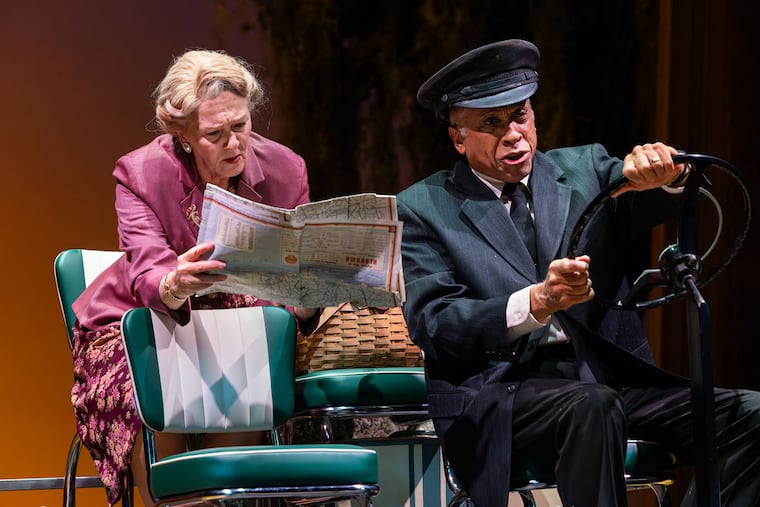Walnut Theatre’s ‘Driving Miss Daisy’ is a play about interracial friendship that doesn’t delve deep enough
The story, that has long questioned because of its depiction of social injustice, is presented without much interrogation

As the January nights get darker and colder, Walnut Street Theatre finally offers Philadelphia audiences a running time they can get behind. At 70 minutes and no intermission, Alfred Uhry’s Driving Miss Daisy does not overstay its welcome.
Set first in 1948 Georgia, the play starts with Daisy Werthan, a 72-year-old Jewish woman who has crashed her car. Five minutes in, her son Boolie hires Hoke Colebum, a 60-something Black man, to drive her around. For the remaining 65 minutes, we are carried through a procession of vignettes through the next 25 years of Miss Daisy and Hoke’s working relationship turned friendship, all without much plot or consequence.
These scenes are paced like a TV sitcom, with conflicts introduced and resolved swiftly. Early on, Miss Daisy accuses Hoke of stealing from her. Soon enough, all is forgiven, and no real change occurs. We never examine why such an accusation comes so easily to her.
We watch Miss Daisy and Hoke get closer, but we rarely understand the how and why of that friendship. Uhry glosses over the most consequential moments of their relationship.
Driving Miss Daisy relies largely on the charm of this “unsuspecting friends” trope to buoy the story but runs away from interrogating what it is about Miss Daisy and Hoke that make their friendship seem unlikely in the first place.
Conflicts playing out as simple misunderstandings don’t examine the inherent race, religion, and class questions that underlie this interracial professional and personal relationship in the 1960s South. Like Huck and Jim, Driving Miss Daisy falls squarely within the unnuanced cross-cultural buddy trope.
Actors Wendy Scharfman (Daisy Werthan), Johnnie Hobbs Jr. (Hoke Colebum), and Scott Greer (Boolie) have wonderful comedic timing. Director Bernard Havard, also president and producing artistic director of Walnut Street Theatre, tries his best to let Uhry’s play shine but doesn’t interrogate the book. Roman Tatarowicz’ imaginative and sleek set makes the setting changes feel light and limber. And yes, there is a perfectly adequate stage car.
Unfortunately, no amount of lighting designer Ryan O’Gara’s perfectly executed sunrises and sunsets bouncing off of Tatarowicz’s dreamscape trees can distract from Uhry’s book’s lack of depth. In powerful scenes, like when Miss Daisy reacts to her synagogue being bombed, the script holds back her grief and rage in the spirit of social nicety, or politeness.
A 1989 film adaptation starring Morgan Freeman and Jessica Tandy won the best picture Oscar over Spike Lee’s Do the Right Thing, a decision that has long been seen as controversial and indicative of the country’s appetite for conversations about social injustice.
There is a scene where Hoke finally questions Miss Daisy when she denies him a bathroom break. “How do you think I feel having to ask you, ‘Can I go make water?’,” he asks. It’s a powerful question but one that this play, with its bid to keep things airy, can’t answer or accommodate. The effect: Audiences suck in their teeth and shift in their seats at Hoke’s mention of segregation, as if made uncomfortable by the brief foray into reality.
The charm of this “unsuspecting friendship” only lasts so long as we don’t question why it was “unsuspecting” in the first place.
Driving Miss Daisy
(Community/Arts) Set in the segregated South, this is the story of an unlikely friendship between a 72-year-old Jewish woman and a 60-something Black man, who is hired to drive her around. Running time: 75 minutes with no intermission.
⌚️ Through Feb. 2,📍 Walnut Street Theatre, 825 Walnut St., 🌐 walnutstreettheatre.org
Theater reviews are produced independently by The Inquirer without editorial input by their sponsor, Visit Philadelphia.